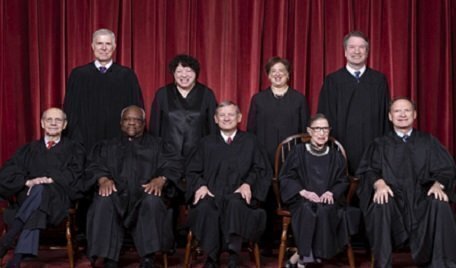Alone among America’s federal courts, the one at the top of the hierarchy has very wide discretion on what it decides, and when. That was a vivid reality on Tuesday, the last day for the Supreme Court to finish out the plans for decisions this term, or else opt to leave much for later. (The major actions or inactions are discussed more fully elsewhere on this page.)
 The Justices had much that they could have put on their decision calendar for the remaining five months of the current term, but they chose none from the available list for prompt action. They did add a significant new case on Second Amendment gun rights, but put it over for review in the term that starts in October.
The Justices had much that they could have put on their decision calendar for the remaining five months of the current term, but they chose none from the available list for prompt action. They did add a significant new case on Second Amendment gun rights, but put it over for review in the term that starts in October.
They took a temporary step, allowing the Trump Administration to resume the stalled enforcement of a wide-ranging limit on service in the military by transgender people, but left any definitive ruling on the legality of that policy for next term.
They stood silent on the future of the Trump Administration’s plan to scuttle the program to protect from deportation some 700,000 undocumented young people, leaving that shield in place until at least the next term. The Trump Administration seems to have the next move.
They said nothing further about whether the federal census that is taken next year can include a controversial question to every American about their citizenship. That may yet be handled in the remaining weeks of the current term, but that depends on actions by the Trump Administration.
Left unmentioned, too, was a case seeking clarification about state power to control what happens to the remains of fetuses after the performance of abortions, and a case about the right of a church to gain access to public funds to pay for preservation of historic structures.
On other culture-war issues, the Court took no action on new cases seeking to test whether federal law that protects men and women from workplace bias based on their sex also protects gays and lesbians from bias on the job based on their sexual orientation, and protects transgender people from discrimination at work or at school based on their gender identity.
While all of those issues were bypassed, for now, the Court did not deny review of any of them. It still could grant some in coming weeks, then hold them over for decision at its next term.
One significant refusal came in the denial of review of a case testing when a public school coach or teacher can pray while in the presence of students.
And, in an intriguing but largely mysterious order, the Justices allowed a bank that is owned or controlled by a foreign government to file, under seal, an appeal seeking to challenge a federal grand jury demand for information. The case is thought to be related to the ongoing federal criminal investigation of Russian interference in the U.S. presidential election in 2016, but that is only an educated guess because all of the filings are secret, as of now. A copy of the appeal, with the secret parts blacked out, was released publicly later in the day but there are so many redactions that nothing further is revealed about either the company or the country involved or the investigation that is involved.
The ultimate fate of that case, too, depends on how ambitious, or cautious, the Justices choose to be.
Lyle Denniston has been writing about the Supreme Court since 1958. His work has appeared here since mid-2011.







